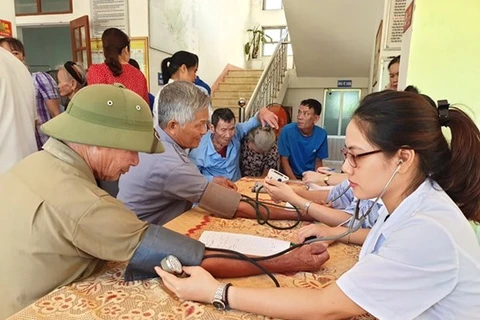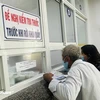
Hanoi (VNS/VNA) - The Ministry of Health (MoH) has approved a project aimed at preventing, detecting, and managing non-communicable diseases and mental health disorders through the end of 2025.
The move is meant to enhance public health protection, care and improvement by strengthening preventive measures, early detection and treatment management.
The project hopes to reduce the prevalence of pre-disease conditions, illnesses, disabilities and premature deaths caused by cancers, cardiovascular diseases, diabetes, chronic obstructive pulmonary disease and asthma as well as mental health disorders.
Hospital reports indicate that 65-75% of inpatients suffer from non-communicable diseases, with oncology, respiratory and cardiovascular departments particularly burdened. Mental health is also a significant challenge.
Statistics from the National Institute of Endocrinology reveal that approximately 6-7% of the population has diabetes. According to the National Cardiovascular Institute of Vietnam, hypertension, the silent killer, affects 25% of people over the age of 25.
The prevalence of non-communicable diseases is rapidly increasing, yet they are detected and treated in only one-third of patients.
Vietnam's high alcohol consumption exacerbates injuries, brain strokes and heart attacks, while the high smoking rate contributes to various diseases, including cancer, chronic obstructive pulmonary disease and cardiovascular issues.
Non-communicable diseases are estimated to account for about 77% of all deaths in Vietnam annually, mainly due to cardiovascular diseases, cancer, diabetes and chronic obstructive pulmonary disease.
In response, the MoH’s project sets several goals for 2024-2025. These include increasing prevention, early detection and treatment management rates for non-communicable diseases and mental health disorders, enhancing the health system's capacity to provide these services and improving monitoring, information management and reporting on non-communicable diseases, mental health disorders and associated risk factors.
Achieving these goals requires organising services for screening, performing health checks, measuring indicators and conducting tests to detect non-communicable diseases and mental health disorders early.
Regular screening should be integrated into medical services, especially at communal health stations, with periodic public health checks and proactive visits by high-risk individuals to medical facilities.
Screening should also be included in the healthcare management of children and students, with workplace health examinations, elderly care and prenatal check-ups for pregnant women.
The target group includes people of all ages, with a focus on those aged 40 and above and individuals determined to be at high risk for specific diseases.
Regular monitoring, check-ups, counselling and prevention are essential for high-risk individuals and those with pre-disease conditions.
This includes managing and preventing cardiovascular risk, counselling for smoking cessation, screening and interventions to reduce harm from alcohol consumption and creating psychological counselling records for those at high risk of mental disorders.
Activities should be organised through integrated health management at educational institutions, workplaces, community health stations and related medical facilities.
The MoH aims to develop and enhance the capacity of the health system to provide these services at all levels./.






















